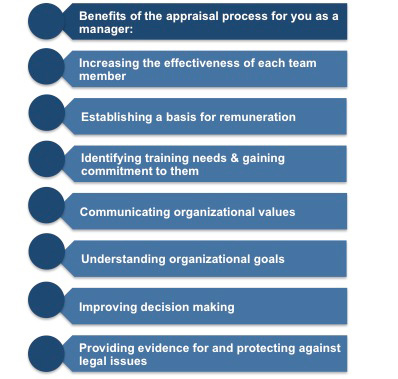Appraisal Process Steps
Assessing performance is a continuous cycle comprising several discrete steps. The adoption of the OSCAR performance management principles described earlier will enable you to work through this process in an efficient and structured way. It will also ensure that the expectations you have of your team members match the expectations that each individual has of themselves.
Most organizations have annual appraisals as this fits in with other annual cycles like budgeting and planning. As part of this process you need to schedule regular reviews throughout the year to suit the needs of your team or department.
For some teams, such as customer support teams, these reviews may be more appropriate on a monthly basis, as this matches the cycle of assignments, updates, information, and feedback on their work.
Other teams, such as a project development team, may require greater flexibility in the timing of reviews. For instance, reviews may need to become more frequent during critical periods of the project.
Whatever type of team you are responsible for you should integrate these regular communications into your performance management process, rather than seeing them as separate from it.
You should assign top priority to your team's appraisals and avoid the temptation to postpone these meetings at times when you have a heavy workload or looming deadlines. Many employees see the appraisal meeting as an important event in which their manager recognizes their achievements in a formal way that becomes a documented part of their personnel record. This Preparing for Appraisal Meeting Checklist outlines eight basic steps you need to complete so that you are properly prepared for your team's appraisal meetings, and this Appraisal Meeting Checklist outlines the steps you need to take to conduct a successful appraisal meeting with a team member.
If the performance appraisal system is linked to the award of pay rises or bonuses then any postponement of these appraisal meetings risks being interpreted as an attempt to avoid remunerating them fairly for their work.
 |
You need to appreciate that the benefits you can gain from conducting an effective appraisal process to monitor your team's performance more than make up for the time invested. The benefits you gain will help you to:
• Increase the individual effectiveness of your team members.
• Transmit the organization's values to your staff.
• Understand and meet organizational goals.
• Improve your decision-making.
• Identify training needs and gain commitment to them.
• Establish a basis for remuneration.
• Protect you from legal problems.
In order to fully appreciate these benefits the appraisal process must also be reliable and valid. The process should yield consistent data regardless of who does the appraising or when they do it - its validity is evident in the direct correlation between the factors being measured and the critical elements of the job.
You may also be interested in:
Performance Management Cycle | OSCAR Principles of Performance Management | Setting SMART Goals and Objectives | Matching Competencies to Roles | Performance Appraisal Role Description | Stages of the Appraisal Process.



